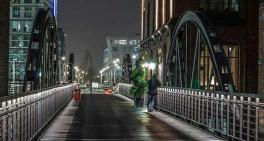Barrett sworn in at court as issues important to Trump await
Breaking Stories
Amy Coney Barrett was formally sworn in Tuesday as the Supreme Court's ninth justice, her oath administered in private by Chief Justice John Roberts. Her first votes on the court could include two big topics affecting the man who appointed her.
The court is weighing a plea from President Donald Trump to prevent the Manhattan district attorney from acquiring his tax returns. It is also considering appeals from the Trump campaign and Republicans to shorten the deadline for receiving and counting absentee ballots in the battleground states of North Carolina and Pennsylvania.
Northeastern Pennsylvania's Luzerne County filed legal papers at the court Tuesday arguing that Barrett should not take part in the Pennsylvania case. It's not clear if she will vote in the pending cases, but she will make that call.
Barrett was confirmed Monday by the Senate in a 52-48 virtual party line vote. She is expected to begin work as a justice on Tuesday after taking the second of two oaths required of judges by federal law. No justice has assumed office so close to a presidential election or immediately confronted issues so directly tied to the incumbent president's political and personal fortunes.
Barrett declined to commit to Democratic demands that she step aside from any cases on controversial topics, including a potential post-election dispute over the presidential results.
At 48, she's the youngest justice since Clarence Thomas joined the court in 1991 at age 43. Other election-related issues are pending at the high court, which next week also will hear a clash of LGBTQ rights and religious freedoms. The fate of the Affordable Care Act is on the agenda on Nov. 10, and Trump himself last week reiterated his opposition to the Obama-era law. “I hope they end it,” he said in an interview with CBS News' “60 Minutes.”
On Friday, Barrett, the most open opponent of abortion rights to join the court in decades, also could be called upon to weigh in on Mississippi's 15-week abortion ban. The state is appealing lower court rulings invalidating the ban. Abortion opponents in Pittsburgh also are challenging a so-called bubble zone that prevents protesters from getting too close to abortion clinics.
The court put off acting on both cases before Barrett joined the court, without offering any explanation in the Mississippi case. It ordered Pittsburgh to file a response to the appeal filed by the protesters, who call themselves sidewalk counselors.
It's not clear that the public will know how Barrett voted in the two abortion cases because the court typically doesn't make the vote counts public when it is considering whether to grant full review to cases.
Related listings
-
Court allows public nuisance suits against 3 Alabama casinos
Breaking Stories 09/26/2020Courts in two rural counties were wrong when they dismissed lawsuits filed by the state seeking to have three casinos declared public nuisances, the Alabama Supreme Court ruled Friday.The decision meant the state can resume cases challenging operatio...
-
Trump announces new list of potential Supreme Court picks
Breaking Stories 09/14/2020U.S. President Donald Trump announced at the White House on Wednesday a new list of 20 more candidates he would consider nominating to the Supreme Court, which is widely seen as his latest effort to bolster support among conservative voters in the No...
-
Supreme Court lifts ban on state aid to religious schooling
Breaking Stories 07/08/2020States can’t cut religious schools out of programs that send public money to private education, a divided Supreme Court ruled Tuesday.By a 5-4 vote with the conservatives in the majority, the justices upheld a Montana scholarship program ...

Nicholas C. Minshew - Minshew & Ahluwalia LLP
Nicholas C. Minshew, Attorney at Law, concentrates his practice in the area of Family Law including divorce, separation, child support, child custody, alimony, division of property, separation agreements, domestic violence, prenuptial agreements, and child support enforcement & modification. Mr. Minshew provides legal services to clients in Washington, D.C., and throughout Maryland, including Montgomery County, Frederick County, and Prince George’s County. Mr. Minshew obtained his Juris Doctorate degree from the American University, Washington College of Law in 2000, where he worked as an editor for the Administrative Law Review. After receiving his law degree, Mr. Minshew worked as an attorney for the global law firm of Morgan, Lewis & Bockius LLP, and for Leonard Street & Deinard LLP representing companies in Federal proceedings. During that time, Mr. Minshew redirected his focus to provide legal services directly to individuals and families.



